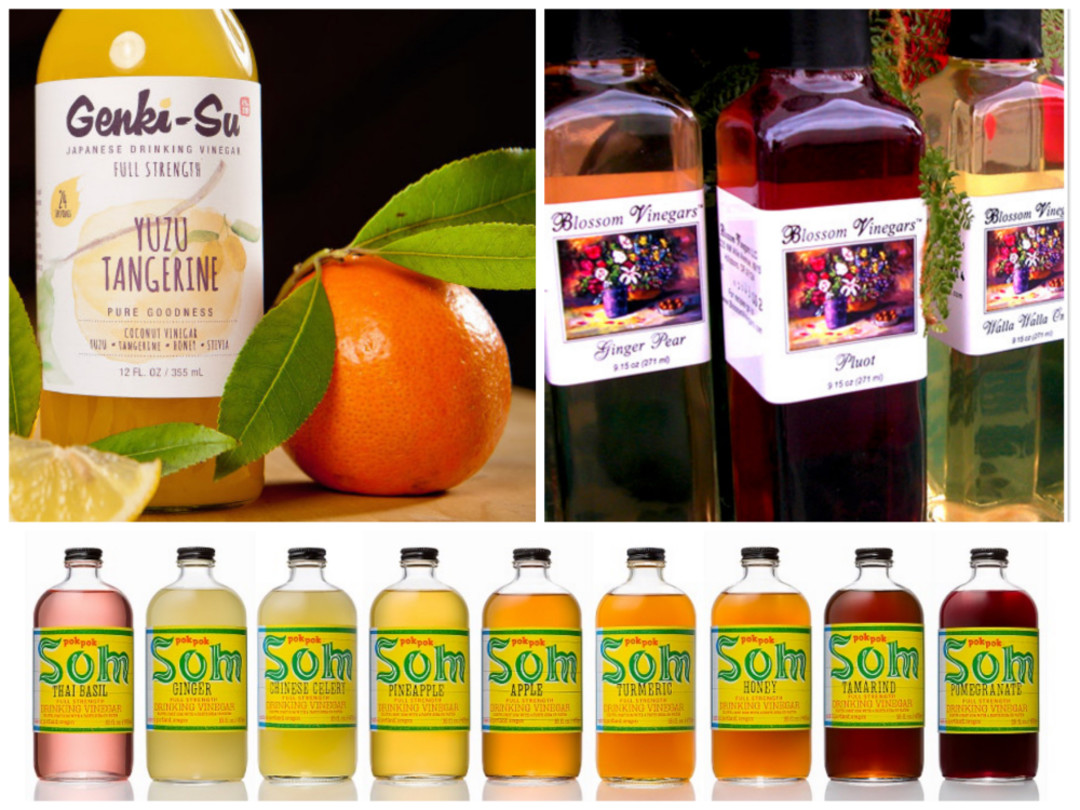Drinking Vinegars: Cocktail Trend or Health Tonic?

In 2009, a Portland Monthly reporter sat down with Pok Pok’s Andy Ricker to chat about an excitingly exotic beverage:
“When I asked owner Andy Ricker to tell me where I might locate drinking vinegars for home consumption, he was hesitant to reveal his sources at first. That’s because, as Ricker points out, Portlanders haven’t yet caught on to this distinctly Asian trend. ‘Even in Portland’s Asian markets, drinking vinegars are hard to find,’ Ricker says.”
That was then. Today, Portland grocery store shelves proffer no fewer than five local drinking vinegar lines, including Pok Pok’s own brand, Som, available in ten flavors from cranberry to Chinese celery. This once-exclusive mixer now appears everywhere from cocktail menus to farmers market booths, so commonplace that—like kombucha, PBR, and third wave coffee—most of us never thought to ask why we’re drinking the stuff in the first place.
Is it healthful? Is it tasty? Is it better than the alternative? What is the alternative?
Local naturopathic physician and author Dr. Jessie Black first heard about drinking vinegar in naturopathic school, where it was suggested as a remedy for low stomach acid or digestive problems. Documented research on the beverage’s benefits date back to ancient Egypt, and the practice was also popular in cultures from American colonists to Japanese samurai.
Dr. Black recommends drinking vinegar before meals for weight loss and glycemic control. Drinking vinegar before meals has proven to improve insulin response, resulting in more insulin sensitivity and less insulin resistance. Drinking vinegar also improves satiety, decreases sugar cravings, and increases digestive capability by stimulating enzymes.
So, yes, the practice of drinking vinegar can be healthful. But are some drinking vinegar products more healthful than others? There’s certainly a disparity in the way local vinegar companies pitch their products. Genki-Su claims its vinegars decrease muscle soreness, increase energy, strengthen immune systems, and lower cholesterol and blood pressure, among many other benefits. Blossom Vinegars emphasizes that its products have no added sugars. Som, meanwhile, explicitly avoids any health claims whatsoever, simply touting its wares as “delicious and refreshing.” (Incidentally, Som's syrupy vinegars are sweetened with cane sugar and pack 16g of sugar per ounce; Genki-Su is sweetened with Stevia.)
Dr. Black, for her part, skips fancy, flavored, sweetened brands in favor of classic apple cider vinegar, the drinking vinegar most studied in scientific literature. She recommends mixing the vinegar with water and a touch of honey for a simple, delicious appertif. We’ve included her recipe below, as well as three local brands available at New Seasons Market:
Dr. Black’s Recipe:
2 teaspoons apple cider vinegar (choose a brand that still has the mother in it)
1/4 to 1/2–cup water
Honey (or stevia) to taste
Pok Pok Som: 15 for 16oz online
Sip this: Turmeric, Tamerind
Genki-Su: $16.99 for 12oz online
Sip this: Ginger-Honey, pre-mixed Tart Tonics
Blossom Vinegars: $13–15 for 8.5oz online
Sip this: Loganberry Beet, Wildflower Honey Cherry
Do you sip vinegar as a weight loss aid, a health tonic, a tasty cocktail mixer, or not at all? Do you have a favorite local brand or flavor? Let us know!
